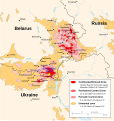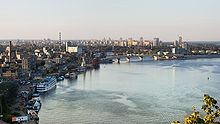Portal:Ukraine
The Ukraine Portal - Портал України
Ukraine Україна (Ukrainian) | |
|---|---|
| ISO 3166 code | UA |
Ukraine is a country in Eastern Europe. It is the second-largest European country after Russia, which borders it to the east and northeast. Ukraine also borders Belarus to the north; Poland and Slovakia to the west; Hungary, Romania and Moldova to the southwest; and the Black Sea and the Sea of Azov to the south and southeast. Kyiv is the nation's capital and largest city, followed by Kharkiv, Dnipro, and Odesa. Ukraine's official language is Ukrainian.
Humans have inhabited Ukraine since 32,000 BC. During the Middle Ages, it was the site of early Slavic expansion and later became a key centre of East Slavic culture under the state of Kievan Rus', which emerged in the 9th century. Kievan Rus' became the largest and most powerful realm in Europe in the 10th and 11th centuries, but gradually disintegrated into rival regional powers before being destroyed by the Mongols in the 13th century. The area was then contested, divided, and ruled by a variety of external powers for the next 600 years, including the Polish–Lithuanian Commonwealth, the Austrian Empire, the Ottoman Empire, and the Tsardom of Russia.
The Cossack Hetmanate emerged in central Ukraine in the 17th century but was partitioned between Russia and Poland before being absorbed by the Russian Empire in the late 19th century. Ukrainian nationalism developed and, following the Russian Revolution in 1917, the short-lived Ukrainian People's Republic was formed. The Bolsheviks consolidated control over much of the former empire and established the Ukrainian Soviet Socialist Republic, which became a constituent republic of the Soviet Union in 1922. In the early 1930s, millions of Ukrainians died in the Holodomor, a human-made famine. During World War II, Ukraine wasoccupied by Germany and endured major battles and atrocities, resulting in 7 million civilians killed, including most Ukrainian Jews.
Ukraine gained independence in 1991 as the Soviet Union dissolved and declared itself neutral. A new constitution was adopted in 1996 as the country transitioned to a free market liberal democracy amid endemic corruption and a legacy of state control. The Orange Revolution of 2004–2005 ushered electoral and constitutional reforms. Resurgent political crises prompted a series of mass demonstrations in 2014 known as the Euromaidan, leading to a revolution, at the end of which Russia unilaterally occupied and annexed Ukraine's Crimean Peninsula, and pro-Russian unrest culminated in a war in Donbas with Russian-backed separatists and Russia. Russia launched a full-scale invasion of Ukraine in 2022. (Full article...)
In the news
- 20 January 2025 – Russian invasion of Ukraine
- Attacks in Russia during the Russian invasion of Ukraine
- Ukrainian drones attack industrial facilities in Tatarstan, Russia, prompting the Russian Federal Air Transport Agency to temporarily suspend flights at Kazan International Airport in Kazan and Begishevo Airport in Nizhnekamsk. (ABC News)
- 18 January 2025 – Russian invasion of Ukraine
- Kryvyi Rih strikes
- Four people are killed and 14 others are injured in a Russian ballistic missile strike on Kryvyi Rih, Ukraine, according to the Governor of Dnipropetrovsk Oblast Serhiy Lysak. (Euronews)
- Russian strikes against Ukrainian infrastructure
- At least four people are killed in Russian missile and drone attacks on Kyiv, Ukraine. (Al Jazeera)
- 16 January 2025 – Ukraine–United Kingdom relations
- British Prime Minister Keir Starmer visits Kyiv, Ukraine, to sign a 100-year agreement with Ukraine that will formalize British economic and military support for Ukraine. (Sky News) (BBC News)
- 15 January 2025 – Russian invasion of Ukraine
- Russian strikes against Ukrainian infrastructure
- Russia launches a major ballistic and cruise missile attack on regions across Ukraine, targeting energy production and compelling authorities to shut down the power grid. (AP)
- 14 January 2025 – Russian invasion of Ukraine
- Attacks in Russia during the Russian invasion of Ukraine
Featured pictures
Did you know (auto-generated)

- ... that Love, a sculpture by Ukrainian artist Alexander Milov, represents two wire-frame adults who appear to be alienated, but inside their bodies two children reach out to each other?
- ... that Inna Derusova was the first woman to be posthumously awarded the title of Hero of Ukraine?
- ... that Jenya Kazbekova, a competition climber on Ukraine's 2024 Olympic team, is the daughter and granddaughter of competition climbing medalists?
- ... that Sarah Ashton-Cirillo, covering the Russian invasion of Ukraine, said that Ukrainians care less about her being transgender than Americans do?
- ... that 30 Ukrainian anarchists defeated more than 500 Austrian imperial soldiers at the Battle of Dibrivka?
- ... that the Dvorichna settlement hromada has remained divided between Russia and Ukraine since the 2022 Kharkiv counteroffensive?
More did you know -
- ... that the longest of the Kiev bridges, the 1,543 metres long Paton Bridge over the Dnieper River, constructed in 1953 was the first fully welded steel construction of such length at that time?
- ... that among many historic landmarks at the Andrew's Descent in Kyiv, there is a medieval Gothic style castle that locals call the "Castle of Richard the Lion Heart" due to the legend the 12th century King of England had visited the building?
- ... that journalist Savik Shuster who used to work for Russian TV channels now prefers to work for the Ukrainian TV because he felt the Russian Government was limiting his journalistic freedom?
- ... that Ukrainian naturalist, lecturer, artist and author John Lhotsky was credited as the first discoverer of gold in New South Wales?
- ... that the Kryvbas economic region in Ukraine is one of the largest iron ore and steel industry centers in Europe?
- ... that at its first years Kiev Zoo had to move its animals into the food storage of the main Kiev railway station for the winter?
Selected article -
The Dnieper (/(də)ˈniːpər/ (də)-NEE-pər), also called Dnepr or Dnipro (/dəˈniːproʊ/ də-NEE-proh), is one of the major transboundary rivers of Europe, rising in the Valdai Hills near Smolensk, Russia, before flowing through Belarus and Ukraine to the Black Sea. Approximately 2,200 km (1,400 mi) long, with a drainage basin of 504,000 square kilometres (195,000 sq mi), it is the longest river of Ukraine and Belarus and the fourth-longest river in Europe, after the Volga, Danube, and Ural rivers.
In antiquity, the river was part of the Amber Road trade routes. During the Ruin in the later 17th century, the area was contested between the Polish–Lithuanian Commonwealth and Russia, dividing what is now Ukraine into areas described by its right and left banks. During the Soviet period, the river became noted for its major hydroelectric dams and large reservoirs. The 1986 Chernobyl disaster occurred on the Pripyat River, a tributary of the Dnieper, just upstream from its confluence with the Dnieper. The Dnieper is an important navigable waterway for the economy of Ukraine and is connected by the Dnieper–Bug Canal to other waterways in Europe. During the 2022 Russian invasion of Ukraine, certain segments of the river were made part of the defensive lines between territory controlled by the Russians and the Ukrainians. (Full article...)
In the news
- 20 January 2025 – Russian invasion of Ukraine
- Attacks in Russia during the Russian invasion of Ukraine
- Ukrainian drones attack industrial facilities in Tatarstan, Russia, prompting the Russian Federal Air Transport Agency to temporarily suspend flights at Kazan International Airport in Kazan and Begishevo Airport in Nizhnekamsk. (ABC News)
- 18 January 2025 – Russian invasion of Ukraine
- Kryvyi Rih strikes
- Four people are killed and 14 others are injured in a Russian ballistic missile strike on Kryvyi Rih, Ukraine, according to the Governor of Dnipropetrovsk Oblast Serhiy Lysak. (Euronews)
- Russian strikes against Ukrainian infrastructure
- At least four people are killed in Russian missile and drone attacks on Kyiv, Ukraine. (Al Jazeera)
- 16 January 2025 – Ukraine–United Kingdom relations
- British Prime Minister Keir Starmer visits Kyiv, Ukraine, to sign a 100-year agreement with Ukraine that will formalize British economic and military support for Ukraine. (Sky News) (BBC News)
- 15 January 2025 – Russian invasion of Ukraine
- Russian strikes against Ukrainian infrastructure
- Russia launches a major ballistic and cruise missile attack on regions across Ukraine, targeting energy production and compelling authorities to shut down the power grid. (AP)
- 14 January 2025 – Russian invasion of Ukraine
- Attacks in Russia during the Russian invasion of Ukraine
Selected anniversaries for January

- January 3, 1681 — Treaty of Bakhchisarai was signed by Russia, the Ottoman Empire, and the Crimean Khanate at the conclusion of the Russo-Turkish War (1676–1681).
- January 10, 1992 — the Ukrainian karbovanets replaced the Soviet ruble at par, with the ISO 4217 code being
UAK. - January 15, 1967 — David Burliuk, an avant-garde artist, died in Long Island, New York.
- January 22, 1919 — The Act Zluky was signed, unifying the Ukrainian People's Republic and the West Ukrainian National Republic.
- January 23, 2005 — Ukrainian president Viktor Yushchenko was inaugurated into office after winning the second run-off elections in late 2004.
- January 29, 1918 — Battle of Kruty takes place between the Ukrainian People's Republic and Bolshevik forces.
Photo gallery
Related portals
Religions in Ukraine
Post Soviet states
Other countries
WikiProjects and collaborations
Associated Wikimedia
The following Wikimedia Foundation sister projects provide more on this subject:
-
Commons
Free media repository -
Wikibooks
Free textbooks and manuals -
Wikidata
Free knowledge base -
Wikinews
Free-content news -
Wikiquote
Collection of quotations -
Wikisource
Free-content library -
Wikiversity
Free learning tools -
Wikivoyage
Free travel guide -
Wiktionary
Dictionary and thesaurus
New articles
Ukrainian editions of Wikimedia projects



![Image 1 Nikolai Aleksandrovich Tikhonov (Russian: Николай Александрович Тихонов; Ukrainian: Микола Олександрович Тихонов; 14 May [O.S. 1 May] 1905 – 1 June 1997) was a Soviet Russian-Ukrainian statesman during the Cold War. He served as Chairman of the Council of Ministers from 1980 to 1985, and as a First Deputy Chairman of the Council of Ministers, literally First Vice Premier, from 1976 to 1980. Tikhonov was responsible for the cultural and economic administration of the Soviet Union during the late era of stagnation. He was replaced as Chairman of the Council of Ministers in 1985 by Nikolai Ryzhkov. In the same year, he lost his seat in the Politburo; however, he retained his seat in the Central Committee until 1989. He was born in the city of Kharkiv in 1905 to a Russian-Ukrainian working-class family; he graduated in the 1920s and started working in the 1930s. Tikhonov began his political career in local industry, and worked his way up the hierarchy of Soviet industrial ministries. He was appointed deputy chairman of the Gosplan in 1963. After Alexei Kosygin's resignation Tikhonov was voted into office as Chairman of the Council of Ministers. In this position, he refrained from taking effective measures to reform the Soviet economy, a need which was strongly evidenced during the early–mid-1980s. He retired from active politics in 1989 as a pensioner. Tikhonov died on 1 June 1997. (Full article...)](http://upload.wikimedia.org/wikipedia/en/d/d2/Blank.png)





























































